

Welcome To The Music Business Registry. Vivendi Quarterly Profits Slide, Universal Music Revenues Up 13.5% Vivendi SA, the French media and communications conglomerate whose holdings include the Universal Music Group, today reported its first quarter revenues remained stable while its net income dropped by 18.5 percent to 672 million euros from 825 million euros a year earlier.
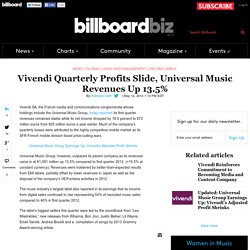
Much of the company's quarterly losses were attributed to the highly competitive mobile market as its SFR French mobile division faced price-cutting wars. Universal Music Group Earnings Up; Vivendi's Adjusted Profit Shrinks Universal Music Group, however, outpaced its parent company as its revenues came in at €1,091 million up 13.5% compared to first quarter 2012 (+15.5% at constant currency). Revenues were bolstered by better-than-expected results from EMI labels, partially offset by lower revenues in Japan as well as the disposal of the company's VE/Fontana activities in 2012. Welcome To The Music Business Registry. Music Publishing Made Easy: The CD Baby Pro Interview DIY Musician Blog. May 8, 2013 Music publishing and CD Baby Pro: an interview with Justin Kalifowitz of SongTrust Music publishing is arguably the most confusing — and important — aspect of the music business.
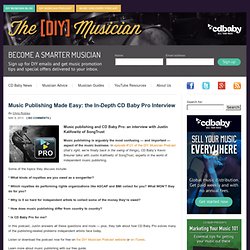
In episode #121 of the DIY Musician Podcast (that’s right, we’re finally back in the swing of things), CD Baby’s Kevin Breuner talks with Justin Kalifowitz of SongTrust, experts in the world of independent music publishing. Some of the topics they discuss include: * What kinds of royalties are you owed as a songwriter? * Which royalties do performing rights organizations like ASCAP and BMI collect for you? * Why is it so hard for independent artists to collect some of the money they’re owed? * How does music publishing differ from country to country? Who Owns Your Music Publishing Rights, & How are the Royalties Split? DIY Musician Blog. Your music publishing rights and you If you’re a songwriter, and you’ve not signed a deal with a music publishing company — you own your music publishing rights!
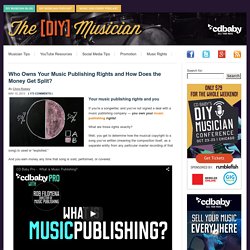
What are those rights exactly? Well, you get to determine how the musical copyright to a song you’ve written (meaning the composition itself, as a separate entity from any particular master recording of that song) is used or “exploited.” And you earn money any time that song is sold, performed, or covered. How do publishing royalties get divided up? For all publishing royalties that are generated from the usage of your music, 50% is paid to the songwriter/s and 50% is paid to the publisher/s. Social Media Isn't a Megaphone, it's a Place to Create a Conversation. Email We asked a few artists, managers, and others in the independent music industry space how they’re using social media, and what tips they could give independent artists looking to grow their social channels.
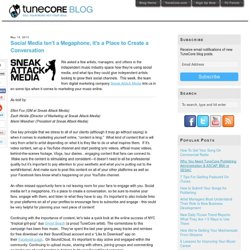
This week, the team from digital marketing company Sneak Attack Media lets us in on some tips when it comes to marketing your music online. Artist Managers Must Understand Their Role Is Now Business Development. Email By George Howard Like everything else in the music business, the role of the artist manager is changing.
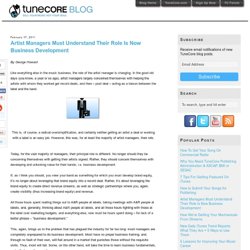
In the good old days (you know, a year or so ago), artist managers largely concerned themselves with helping the artists with whom they worked get record deals, and then – post deal – acting as a liaison between the label and the band. This is, of course, a radical oversimplification, and certainly neither getting an artist a deal or working with a label is an easy job. However, this was, for at least the majority of artist managers, their role.
Today, for the vast majority of managers, their principal role is different. Who Needs a Record Label? The Hollywood Approach. Guest post by Patrick (Praverb Dot Net) Nowadays everyone is a recording artist.
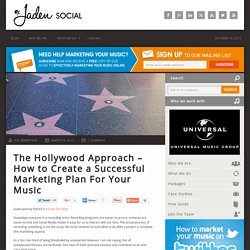
Recording programs are easier to access, cameras are easier to find, and Social Media makes it easy for us to interact with our fans. The actual process of recording something is not the issue, the issue revolves around what to do after a project is complete (the marketing aspect). As a fan I am tired of being blindsided by unexpected releases.
I am not saying that all unexpected releases are lackluster, but most of them promote laziness and contribute to an over saturated genre. It seems that artists nowadays care about quantity as opposed to the quality of their work. Most artists nowadays present projects that are not based on strategy. MTV Rolls out New Opps for Artists to be Seen and Heard - Hillary Atkin - Hillary Atkin - MediaBizBloggers. Published: May 14, 2013 at 07:53 PM GMT Last Updated: May 14, 2013 at 07:53 PM GMT By Hillary Atkin More than three decades after its debut created a seismic shift in the pop culture landscape, it can be very easy to forget that MTV still stands for music television.
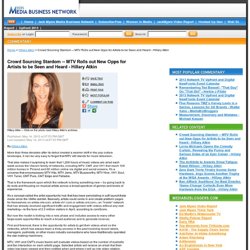
That also makes it surprising to learn that 1,200 hours of music videos are aired each week across the Viacom family of networks, including MTV, CMT, and VH1 that reach 100 million homes in TV-land and 60 million online via digital and social screens. How We Discover And Consume Music [INFOGRAPHIC] 7 Deadly Sins Musicians Are Committing on Facebook & Twitter. Are you committing any of these social media sins?
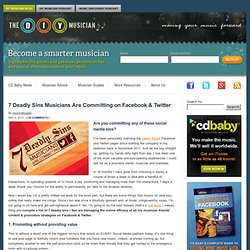
I’ve been personally manning the Jaden Social Facebook and Twitter pages since starting the company in my bedroom back in November 2011. And let me say straight up, getting my hands dirty right from day 1 has been one of the most valuable and eye-opening experiences I could ask for as a business owner, musician and marketer. In 18 months I have gone from checking in barely a couple of times a week to deal with a handful of interactions, to spending upwards of 12 hours a day monitoring and managing more than 100 interactions 7 days a week (thank you Chrome for the ability to permanently pin tabs to the browser window).
Now I would say I’m a pretty chilled out dude for the most part, but there are some things that musos do (and say) online that really make me cringe. Since I too was once a blissfully ignorant and, at times, cringe-worthy muso, I’m not going to sit here and get self-righteous about it. 1. 2. 3. 4. 5. 6. 7. . — Nic.